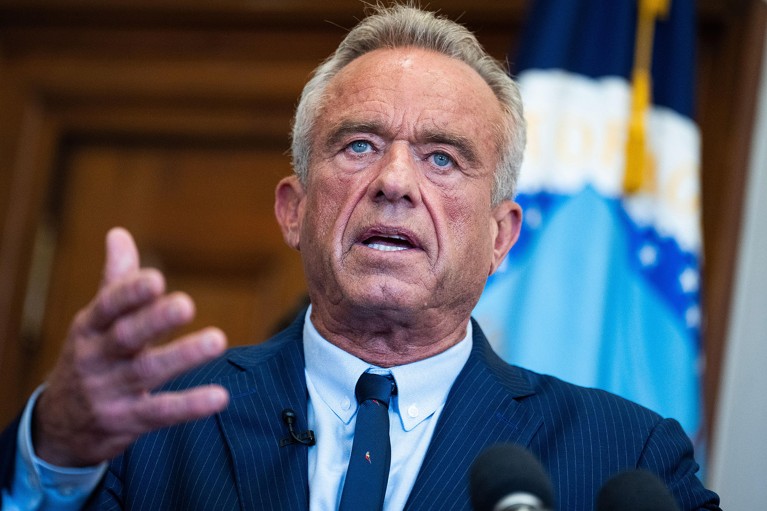
Robert F. Kennedy Jr wants a study about vaccines retracted.Credit: Tom Williams/CQ Roll Call/Sipa US via Alamy
US health secretary and vaccine sceptic Robert F. Kennedy Jr has called for the retraction of a Danish study that found no link between aluminium in vaccines and chronic diseases in children — a rare move for a US public official. Aluminium has been used for almost a century to enhance the immune system’s response to some vaccines. But some people claim the ingredient is linked to rising rates of childhood disorders such as autism.
Public-health officials in Kennedy’s position rarely request that studies be retracted, says Ivan Oransky, a specialist in academic publishing and co-founder of the media organization Retraction Watch. Through this request, “Secretary Kennedy has demonstrated that he wants the scientific literature to bend to his will”, says Oransky.
The study1 in question, published in Annals of Internal Medicine in July, is one of the largest of its kind, looking at 1.2 million children born over more than two decades in Denmark. The authors reported that no significant risk of developing autoimmune, allergic or neurodevelopmental disorders was associated with exposure to aluminium compounds in vaccines.
In an opinion piece published on TrialSite News on 1 August, Kennedy called into question the study’s methodology, analysis and results. Since his appointment as head of the US Department of Health and Human Services, Kennedy has bypassed normal scientific review processes to change vaccine recommendations and terminated grants for projects on mRNA vaccines.
Annals of Internal Medicine says it stands by the study and has no plans to retract it. Christine Laine, editor in chief for the journal, wrote in a comment on the study’s web page on 11 August that “retraction is warranted only when serious errors invalidate findings or there is documented scientific misconduct, neither of which occurred here”.
The Department of Health and Human Services said that Kennedy’s article spoke for itself, and that the department did not have any further comment in response to Nature’s questions about Kennedy’s request for a retraction.
Widely used
Aluminium, in the form of salts, such as potassium aluminium sulfate, have been administered in vaccines — for diseases ranging from whooping cough to pneumonia — to millions of people worldwide, and the vaccines have been widely studied for safety issues2,3. Gary Grohmann, an independent virologist in Canberra, says there is no evidence of significant side effects caused by the small amount of aluminium in vaccines.
But in 2011, a study4 published in the Journal of Inorganic Biochemistry claimed to show a causal relationship between rising autism diagnoses in children and increased exposure to aluminium-containing vaccines. In 2012, the World Health Organization’s Global Advisory Committee on Vaccine Safety said the study and another by the same authors were “seriously flawed” because they used inappropriate study designs, incorrect assumptions and questionable data.
Since then, Grohmann says, the claim that aluminium in vaccines causes autism has been debunked “again and again”. “If there was a mechanism of action where a particular vaccine caused autism, we’d see it in 80, 90, 100% of people receiving the vaccine, and we don’t,” he says. Any association between autism and vaccines is probably a coincidence of timing, he says. “In other words, vaccines might be given at the age of two, and autism genetically might also kick in at the age of two,” he adds.
Allen Cheng, an epidemiologist at Monash University in Melbourne, Australia, says the Danish study adds to the evidence that vaccines containing aluminium are safe.
Kennedy’s concerns
Among Kennedy’s criticisms of the Danish study are that the analysis excluded children who had died before the age of two. According to Kennedy, this means that the children “most likely to reveal injuries” associated with aluminum exposure were excluded.
Kennedy also criticized the fact that the authors did not compare vaccinated and unvaccinated children to determine whether any aluminium exposure causes harm, even though they had some data on unvaccinated children.
Other critiques posted on the journal website overlapped with Kennedy’s criticisms, says Anders Hviid, the senior author and an epidemiologist at the Statens Serum Institut in Copenhagen, Denmark’s public-health agency. Hviid says he and his colleagues addressed the critiques “one by one”. He also published a rebuttal of Kennedy’s article on TrialSite News on 3 August.
Source link
